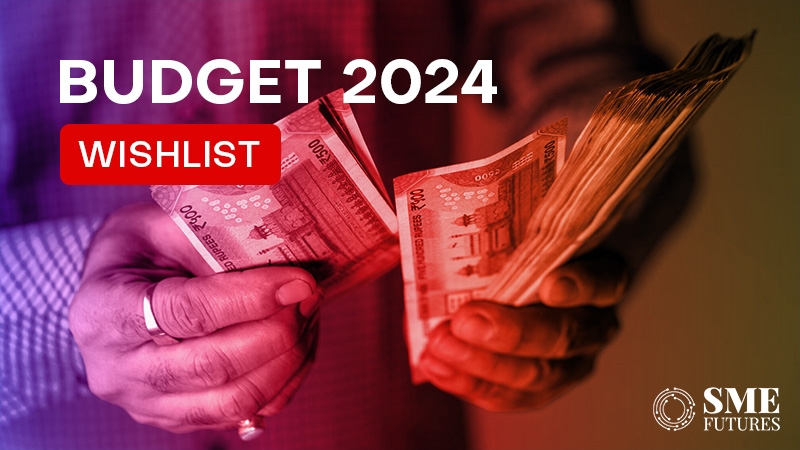MSMEs sector needs measures around incentives to use advanced technology, more access to working capital, while TReDS should be elevated as unified platform for them
With government all set to present the interim budget 2024, Indian sectors also gears up for the budget session in 2024. Even though its short term budget with vote on account, stakeholders are still betting their hopes on various recommendations.

Sundeep Mohindru, Promoter and Director of M1xchange, India’s leading TReDS (Trade Receivables Discounting System) platform, has articulated key expectations that could shape the fiscal landscape and offer substantial support to Micro, Small, and Medium Enterprises (MSMEs).
Incentives for MSMEs to formalise
With over half of the $5tn economic dream of the nation resting on the shoulders of MSMEs, there have been several policy initiatives undertaken over the last couple of years to boost their productivity. The expectations from the upcoming budget, will be to continue upon that path through fiscal support. For instance, of the 6.3 crore MSMEs in India, only half are registered on Udyam – a platform that creates many opportunities for GST and non-GST registered small businesses to avail of government schemes, production related incentives and formal channels of credit. A major driver will be to bring the remaining half to register on Udyam, which will act as a catalyst for MSMEs to formalise and reap the benefits.
Support for financers to promote SMEs working capital loan
The regulator has been prudent with corrective measures to stem inherent risks rising out of unsecured consumer lending, which has been growing rapidly due to digitisation. It is important for the government to come out with supporting measures that compel banks and NBFCs to shift their lending portfolio more towards small business Working capital loans.
Some measures could be in the form of incentives for banks and NBFCs to use technology to minimise risks while providing collateral free Working capital lending to MSMEs will be a win-win. Such support would not only boost business activity for banks but also facilitate the rebalancing of their portfolios.
Measures to address delayed payments to MSMEs
The MSMEs’ desire for credit has significantly increased, but there is still a Rs. 20–Rs 25 trillion credit gap in the industry as a whole. One of the primary obstacles encountered by these MSMEs is the problem of delayed payments. This hampers the working capital flow and competitiveness of these enterprises in the market, preventing them from seizing new possibilities and fulfilling orders.
Based on statistics accessed through the government’s MSME Samadhaan portal, which tracks issues related to delayed payments, only 33,262 of the 1.68 lakh complaints have been resolved. To achieve the government’s goal of increasing the contribution of MSMEs to the GDP from 30 percent to 50 percent by 2025, it is necessary to establish policy frameworks that specifically target these challenges faced by MSMEs and help in resolving them.
Support for TReDS
TReDS has progressed decently well with all the three platforms together expected to facilitate Rs. 1.40 lakh crore of financing. This is nearly double of the financing facilitated at the end of FY22-23, which stood at Rs. 75 thousand crore.
TReDS have benefits for all its stakeholders – facilitates collateral free, low interest working capital for MSMEs, provides banks and NBFCs with near zero defaults on their SME loan book and helps corporates improve cost efficiency through timely supply chain finance for their suppliers. With the government now bringing trade credit insurance as the fourth participant on TReDS to further support banks and NBFCs to go aggressive on Supply Chain Finance, it is important to allocate budgetary push to support insurers to quickly adopt the platform.
Under NCGTC, the CGFSF (Credit Guarantee Fund Scheme for Factoring) has been proposed to address coverage of the govt.-backed scheme for factoring transactions on TReDS. The govt shall advise to start active operations of this fund on TReDS at the earliest.
Allow TReDS 2nd Window
TReDS ‘second window’ is envisaged as ‘buyer less’ and removes the need of the buyers to accept the invoices. Unlike, TReDS, the ‘Second Window’ will offer a ‘with recourse’ supplier financing for MSME sellers, backed by advanced analytics and access to consent driven, publicly available databases such as GSTN, AA, PCR etc.
One of the possible solutions in providing Buyers acknowledgement on TReDS using GSTN is envisaged through combination of liberated data and agreement between MSME sellers and TReDS platform lenders, for obtaining cash flow lending for its various invoices. Various India Stack Open APIs integration into TReDS platform will facilitate MSME onboarding , invoice verification via GST ,MSME bank transactional cash flow data, GST data, past loans, and credit history, repayments tied to electronic liens on cash inflows.
Making TReDS a unified platform for MSME payments
Paragraph 4.8 of report by Standing Committee on Finance (2020-2021) presented to Seventeenth Lok Sabha for The Factoring Regulation (amendment) bill, 2020, stipulate : “The Committee’s opinion is that the compulsory listing of all GSTN invoices on the TReDS and the consequent tracking of when these payments are made, provides excellent economic data on the state of the economy. It will also provide valuable credit information to enable credit scoring of various companies and government entities.”

